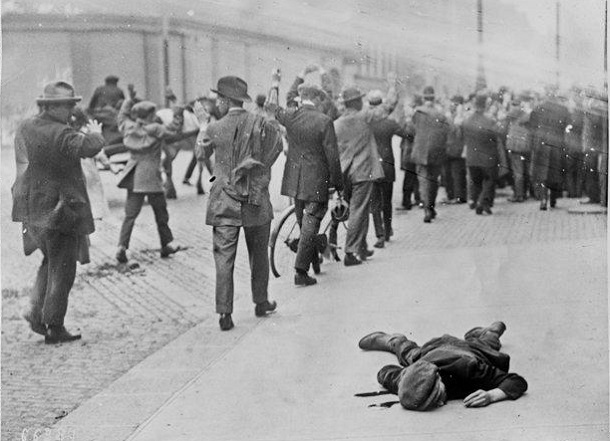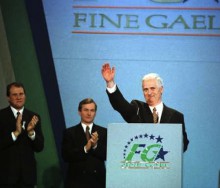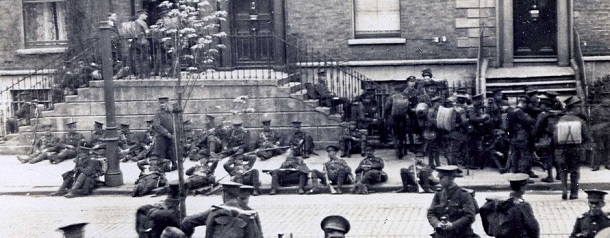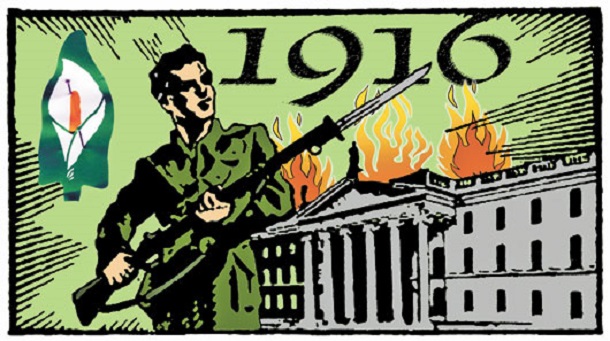9 April 2015
No equivalence between Irish freedom fighters and the foot soldiers of British imperialism

● An Irishman after being shot dead by the British Army on Dublin's quays while others are placed under arrest
AS TENS OF THOUSANDS of people gathered at monuments and graveyards across Ireland (and as far away as Australia) to commemorate the 99th anniversary of the Easter Rising, there was a marked shift in the attitude and discourse of the state and their cheerleaders to that historic event.
The previous disinrerest and apathy which personified Fine Gael's and Labour's approach – along with much of the mainstream media – has been replaced with a sudden urge to equate the Irish patriots of 1916 with the British occupation forces and their locally-recruited colonial militias against whom they fought.

First out of the gates was former Fine Gael Taoiseach John Bruton, once famously dubbed "John Unionist", who throughout Easter Week subjected audiences to his inane ramblings alongside inuts from a handful of historians and individuals with various ties to the British military.
Bruton has become the go-to man when RTÉ want to trot out somebody to articulate the shoneen revisionist view of history.
John Bruton claims the Easter Rising was "not justified" and that freedom could have been achieved via the Home Rule Bill in the British Parliament. He believes that everybody should be commemorated and that venerating the leaders of 1916 glorifies violence and is inappropriate.
Ironically, in the same breath, Bruton fawns over his hero and Irish Parliamentary Party MP John Redmond – a man who was the recruiting sergeant for the British Army in Ireland and sent tens of thousands of young men marching towards their deaths in Flanders' fields with the promise of Home Rule. James Connolly called the Home Rule Bill "a carefully-staged pantomime to fool nationalist Ireland". Fittingly, Bruton's hero was Britain's stooge.
One thing which we should all agree with is that everybody has the right to be remembered. Bruton and other commentators, however, are unable or unwilling to recognise that the cause for which the Volunteers in 1916 died – justice, freedom and equality – is far more noble and worthy of commemoration than the cause of Empire for which so many others lost their lives not just here in Ireland but also at the Somme and across the globe for colonialism and imperialism.

● British Army soldiers from the Sherwood Foresters regiment, 1916
On Wednesday of this week, the relatives of 31 British soldiers killed in the Battle for Mount Street Bridge called for a permanent memorial to those soldiers to be erected in Dublin, with one suggesting a joint monument to these soldiers and the Irish Volunteers who died in the battle. It was a theme taken up by RTÉ's Morning Ireland on Thursday.
Sinn Féin TD Peadar Tóibín observed:
"British soldiers imposing oppression through violence should not be commemorated equally with Volunteers seeking Irish freedom."
If Britain's cheerleaders wish to commemorate their soldiers who died fighting to suppress another nation and the aspirations of its people, then fire away, but they should not expect those whose parents and grandparents were at the wrong end of a British rifle to erect memorials on their own streets to their oppressors.
With a British public who are embarrassed enough by their Government's recent disastrous invasions and occupations of Iraq and Afghanistan, one doubts if those on the wrong side of history want to start dragging up and reminding themselves of an almost endless list of other colonial 'adventures'.
Can anybody credibly imagine the United States of America telling its citizens not to celebrate the Fourth of July and to instead remember all those British soldiers that were killed trying to stop them from gaining their independence and freedom?
Does anybody seriously believe the British citizens of the Channel Islands – who celebrate every 9 May 'Liberation Day' (when Nazi forces surrendered on Jersey and Guernsey) should shed tears for Third Reich soldiers killed in battle during World War Two?

What is very obvious to all is that part of the state's uncomfortability in commemorating the Rising is that it is very hard to justify a violent uprising against foreign oppression when, since the late 1960s, the state and its main parties have been shouting from the rootops in condemnation of Irish people 90 miles up the road from the Dáil for doing just that against a sectarian Orange state created and maintained through repression of Irish nationalists.
Fine Gael, Fianna Fáil and Labour realise that the Proclamation is unfinished business – so it's best not to draw attention to it.
Some of those Irish citizens like John Bruton & Co who hold such strident anglophilic views on the Easter Rising cloak their positions as being somehow "grown-up" or "mature". In reality, they suffer from a debilitating affliction of colonial mentality, the main symptom of which is a nauseating inferiority complex and a barely-concealed fawning for those who once reigned over them.
Meanwhile, the upsurge in attendance at Easter Rising events this year shows that ordinary Irish people, North and South, have an appetite to fittingly commemorate the men and women who sacrificed all for Ireland – and will continue to strive to fulfil the ideals of the Proclamation, a truly independent Ireland which guarantees equal rights and equal opportunities to all its citizens.
◼︎ Mark Moloney's great-grandfather, James Moloney, was a member of the East Limerick IRA and took part in the successful attack against Kilmallock RIC Barracks in May 1920. He was arrested a short time later and spent over a year as a prisoner of war in Brixton Prison, England, before his release at the end of the Tan War in April 1922.
His Glasgow-born Irish-Italian grand uncle, Antony Marcantonio, was a member of the British Army's Black Watch regiment and died in World War One, aged 21, in February 1918.
Follow us on Facebook
An Phoblacht on Twitter
Uncomfortable Conversations

An initiative for dialogue
for reconciliation
— — — — — — —
Contributions from key figures in the churches, academia and wider civic society as well as senior republican figures





